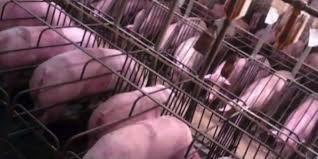 It is evident that as an industry, hog producers are continuing to oppose California Proposition #12 and Massachusetts Question #3 welfare mandates. At issue is the intent to retain gestation crates. In reality, almost a third of the nation’s sows are in group housing and there is adequate pork derived from upgraded housing to supply the needs of California and the New England states that are net importers of pork and derived products.
It is evident that as an industry, hog producers are continuing to oppose California Proposition #12 and Massachusetts Question #3 welfare mandates. At issue is the intent to retain gestation crates. In reality, almost a third of the nation’s sows are in group housing and there is adequate pork derived from upgraded housing to supply the needs of California and the New England states that are net importers of pork and derived products.
The power of the National Pork Producers Association is demonstrated by the actions of politicians including the Attorneys General of hog-producing states who were collectively unsuccessful in opposing Proposition #12 at the Supreme Court. The same cohort is now attempting to reverse Massachusetts Question #3 with opposition evident in Congress. Rep. Ashley Hinson (R-IA) is urging the House Committee on Agriculture to incorporate provisions in the 2023 (or later) Farm Bill to effectively negate the restrictions imposed by California Proposition #12.
The Attorney General of Iowa, Brenna Bird, maintains that the voters’ initiative in Massachusetts would “cost pork producers across the country hundreds of millions of dollars, drive many pork producers out of business and dramatically raise pork prices”. These assertions are not supported by sound independent economic evaluation. It is true that farmers would require additional space to accommodate group housing and the transition from gestation crates would involve capital investment and higher fixed and variable production costs. Economic studies show that the cost involved as passed on to  consumers would not materially depress consumption. In effect, at this time no incremental capital would be required to satisfy the needs of California and New England states given the availability of pork from sows held in group housing.
consumers would not materially depress consumption. In effect, at this time no incremental capital would be required to satisfy the needs of California and New England states given the availability of pork from sows held in group housing.
With regard to retail and consumer rejection of gestation crates, the train has obviously left the station. Retail chains and restaurants are imposing minimal standards of welfare that disqualify gestation crates. Unless the industry changes, irrespective of legislation, pork which does not comply with the equivalent of Proposition #12 requirements may be discriminated against in the marketplace and be suitable only for export.
Proponents of the pork status quo desire a federal law that would effectively invalidate state requirements paralleling California Proposition #12. This is an ironic turn of events given that in 2013, the pork industry was responsible for scuttling the “Egg Bill” amendment to the Farm Bill that would have established a uniform Federal standard for housing egg-producing flocks. This forced the industry to undergo a voluntary transition to alternative systems to conventional cages to supply a market representing approximately one third of consumption. The industry absorbed the immense capital cost without government support and installed aviary or floor systems. In addition a small proportion of the national flock was allowed either limited outside access or more extensive pasture management.
When it suited the pork producers, a federal law was considered inappropriate in 2013. Now that the hog industry is facing market reality in addition to state-mandated standards, a federal law is considered to be their salvation ten years later.